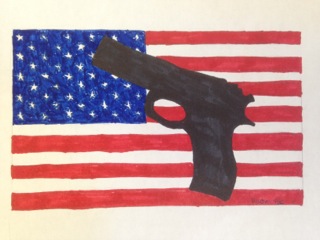Michael Brown was killed on Saturday, August 8, at 12:01 in the morning.
He was unarmed and, in my opinion, had no real reason to be stopped. Yet he emerged from his encounter with Ferguson (Missouri) Police Officer Darren Wilson with six bullets in his body.
When I first saw this story on the news, my initial reaction should have been just one of shock. Instead, the first two words that came to mind were: “Not again.”
The killing of innocent black men by police force or extrajudicial vigilantes is not an uncommon thing.
On November 23, 2012, 17-year-old Jordan Davis was killed by a civilian for playing loud rap music from his car in a Florida parking lot.
Later that year, a few hours south in Florida, 17-year-old Trayvon Martin was killed for “looking suspicious” while he walked home to his house after going out to buy some Skittles and a Snapple at the local 7-Eleven.
Earlier this year, on July 17, Eric Garner, a 43-year-old father of six from Staten Island, was choked to death by an NYPD officer for selling untaxed cigarettes.
All of these American men and boys had lives, hopes, dreams and families—not to mention should have had many more years to live their lives in peace. Sadly, they are not alone. I have mentioned only four of the many unjust murders that have taken place in this country on the basis of the color of a man’s skin, the ones that have gained the most press.
Believe it or not, police officers or extrajudicial vigilantes kill a black American every 28 hours. I hope many of you are reluctant to believe what you just read. It is a shocking statistic—a statistic we should have no need for.
While surely some of these shootings could have been responses to actual crimes, and while surely not every single victim was innocent, it is undeniable that the numbers just don’t match up. For black Americans, there are 17.51 homicides per 100,000 people, while the national average is 4.4 per 100,000, making the black homicide rate in the United States around four times higher than the national average.
It is statistics like these that upset me. On a daily basis, black Americans are profiled as criminals, thugs and gangsters by police and everyday citizens alike. We are arrested disproportionately for offenses others would not be arrested for, killed in higher numbers and are told to think it is okay.
It was after being followed around a store by security and questioned by the management for the umpteenth time that I decided I had had enough. It was when my 13-year-old brother told me to turn off the rap music in the car before I got shot, like Jordan Davis, that I decided I had had enough. It was when I saw, on the news, yet another boy the exact same age as me get shot for no other reason than color profiling that I decided I had had enough.
But these unjust homicides are not just a black problem. Nor are they a white problem. They are an American problem. Whether you are White, Black, Latino, Asian, Native American, or Arabic—as Americans we have a duty to be outraged for our fellow countrymen when they are unjustly slain.
Deerfield students: whatever race you are, when you see kids your age—who under different circumstances could very well be your classmates, friends or family members—and these kids get murdered for simple nothings, you should feel something. You should feel saddened, and most importantly, you should act on that feeling—to make a change.
Do your research, learn your facts and open your eyes to the world we live in. At Deerfield, we live in a safe, comfortable, happy and pleasant environment, a bubble thankfully distant from the sorrows and injustices of the world. But for many people in many places, fear of the police and random shootings are very real, very valid concerns. For many people in many places, law enforcement officers are a source of unease and fear—not a source of security, as they should be.
It is my opinion that no one in this country should fear for their lives because of the color of their skin.
Again, this is an American problem. And we need to be the ones to solve it.

